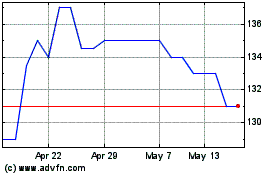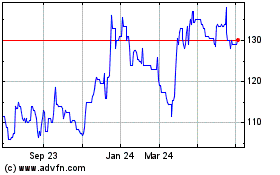TIDMECEL
RNS Number : 5192O
Eurocell plc
07 November 2016
PUBLICATION OF ANNUAL REPORT AND FINANCIAL STATEMENTS
Eurocell plc has, in accordance with LR 9.6.1R of the Listing
Rules, submitted to the Financial Conduct Authority's National
Storage Mechanism copies of the following:
-- the Annual Report and Financial Statements 2015
-- Notice of 2016 Annual General Meeting
-- Form of Proxy for the 2016 Annual General Meeting
In accordance with LR 9.6.2R of the Listing Rules, the Company
has submitted a copy of the resolutions passed at the Annual
General Meeting (other than resolutions concerning ordinary
business) to the UK Listing Authority via the National Storage
Mechanism.
The documents will shortly be available for inspection at
www.morningstar.co.uk/uk/NSM.
The Annual Report and Financial Statements, Notice of Annual
General Meeting and Form of Proxy are also available on the
Eurocell plc website at www.eurocell.co.uk/investors.
A condensed set of the Group's financial statements and
information on important events that occurred during the financial
year ended 31 December 2015 and their impact on the financial
statements were included in Eurocell plc's Final Results
announcement on 16 March 2016. That information together with the
information set out below, which is extracted from the Annual
Report and Financial Statements for the year ended 31 December
2015, constitute the material required by DTR 6.3.5 of the
Disclosure Guidance and Transparency Rules which is required to be
communicated to the media in full unedited text through a
Regulatory Information Service. This announcement is not a
substitute for reading the full Annual Report and Financial
Statements. To view the Annual Report and Financial Statements, the
Final Results announcement and the slides of the Final Results
presentation please visit www.eurocell.co.uk/investors.
PRINCIPAL RISKS
1. Market risk
Risk: Our products are used in the residential and commercial
building and construction markets including within the RMI sector.
Wider economic conditions and government policy can have an impact
on demand in the construction sector and levels of disposable
income can impact activity in the RMI market.
Impact: Uncertainty over the economic climate makes it difficult
to predict accurately levels of demand for our products.
Mitigation: There is greater risk in the new build sector where
we are less exposed. Our service driven strategy means that we are
well able to withstand short term economic pressures on our
business.
2. Severe weather
Risk: Our business can be severely affected by unexpected or
prolonged periods of severe weather in the UK.
Impact: Severe weather has an impact on the housing sector
generally which drives demand for our products and it will also
affect our ability to deliver products to our branches and our
customers.
Mitigation: We expect some inclement weather in December and
January and plan accordingly. It is unusual for severe weather to
extend to two weeks or more.
3. Raw Materials cost fluctuations
Risk: We depend on the supply of PVC resin to be able to
manufacture our products. PVC resin is an indirect derivative of
the oil market and prices are therefore subject to fluctuation on a
monthly basis.
Impact: There can be a delay in passing on our cost increase to
our customers in the form of selling price increases which can
affect our margins. Whilst customers expect selling price
reductions when the price of resin falls, they are reluctant to
accept selling price increase when the price of PVC resin
rises.
Mitigation: We ensure that our supply contracts with major
customers contain mechanisms to deal with significant variations in
the PVC resin price. We aim to increase the amount of post-consumer
waste we use in our product.
4. Changes in laws and regulations pertaining to our products
Risk: We are high users of energy and we use various polymers
and chemicals in our manufacturing processes. There is a risk that
the laws pertaining to the usage of these resources could change
which would in turn would increase our cost base.
Impact: Any increases in our cost base would affect margin if we
were unable to pass these increases on to customers in the form of
price increases.
Mitigation: We monitor policy so that we are prepared for any
legislative changes well before they are introduced.
5. Changes in laws and regulations pertaining to the environment
Risk: Given the nature of the Company's manufacturing activities
there is an inherent risk of environmental liability.
Impact: We could be held liable for environmental damage as a
result of hazardous materials.
Mitigation: We ensure that we comply with all current
legislation pertaining to the environment and adopt best practice
wherever possible.
6. Failure of products to perform
Risk: Customers or end users could receive inferior quality
products either due to manufacturing issues or due to issues at our
customers.
Mitigation: Given the nature of modern communications a
perception could be circulated quickly that our products fail to
perform adequately.
Impact: We have robust quality control processes which minimise
the risk of inferior products being shipped to our customers. Where
end users have complaints we have a team of dedicated technical
service people who will visit the end user on site with a view to
resolving all problems.
7. Recoverability of trade receivables
Risk: The company does not insure the credit it extends to its
customers and there is an inherent risk that customers could
default on the amounts they owe.
Mitigation: There is a risk of material bad debt charges in the
event of customer defaults.
Impact: We have rigorous credit control procedures and monitor
larger exposures at all times. We adopt a prudent approach towards
provisioning.
8. Dilapidation Costs
Risk: Most of the property we use is under lease. When these
leases come to an end there is likely to be dilapidations to the
properties which need to be rectified.
Mitigation: The inherent uncertainty in assessing future charges
relating to dilapidations means that the provisions we make could
be misstated.
Impact: Our methodology for fitting out buildings minimises the
structural impact we have on our buildings. This together with
training our people means that we reduce our exposure to
dilapidations costs as much as we can. We provide for future
dilapidations costs on a prudent yet commercially realistic
basis.
STATEMENT OF DIRECTORS' RESPONSIBILITIES
The Directors are responsible for preparing the Annual Report,
the Directors' Remuneration Report and the Financial Statements in
accordance with applicable law and regulations.
Company law requires the Directors to prepare Group and Company
financial statements for each financial year. Under that law, the
Directors are required to prepare the Group financial statements in
accordance with applicable law and International Financial
Reporting Standards (IFRSs) as adopted by the European Union (EU)
and have elected to prepare the Company financial statements in
accordance with applicable law and United Kingdom (UK) Accounting
Standards (UK Generally Accepted Accounting Practice) including
Financial Reporting Standard 101 Reduced Disclosure Framework (FRS
101).
Under company law the directors must not approve the Financial
Statements unless they are satisfied that they give a true and fair
view of the state of affairs of the Group and the Company and of
the profit or loss of the Group for that period. In preparing these
Financial Statements, the directors are required to:
-- select suitable accounting policies and then apply them consistently;
-- make judgements and accounting estimates that are reasonable and prudent;
-- state whether IFRSs as adopted by the European Union and
applicable UK Accounting Standards have been followed, subject to
any material departures disclosed and explained in the Group and
Company Financial Statements respectively; and
-- prepare the Financial Statements on the going concern basis
unless it is inappropriate to presume that the Company will
continue in business.
The Directors are responsible for keeping adequate accounting
records that are sufficient to show and explain the Company's
transactions and disclose with reasonable accuracy at any time the
financial position of the Company and the Group and enable them to
ensure that the Financial Statements and the Directors'
Remuneration Report comply with the Companies Act 2006 and, as
regards the Group Financial Statements, Article 4 of the IAS
Regulation. They are also responsible for safeguarding the assets
of the Company and the Group and hence for taking reasonable steps
for the prevention and detection of fraud and other
irregularities.
The directors are responsible for the maintenance and integrity
of the Company's website. Legislation in the United Kingdom
governing the preparation and dissemination of financial statements
may differ from legislation in other jurisdictions.
The directors consider that the Annual Report and Accounts,
taken as a whole, is fair, balanced and understandable and provides
the information necessary for Shareholders to assess the Company's
performance, business model and strategy.
Each of the directors, whose names and functions are listed on
pages 51 to 52, confirm that, to the best of their knowledge:
-- the Group Financial Statements, which have been prepared in
accordance with IFRSs as adopted by the EU, give a true and fair
view of the assets, liabilities, financial position and profit of
the Group; and
-- the Directors' Report includes a fair review of the
development and performance of the business and the position of the
Group, together with a description of the principal risks and
uncertainties that it faces.
The directors also confirm that:
-- so far as they are aware, there is no relevant audit
information of which the Company's auditors are unaware; and
-- they have taken all the steps that they ought to have taken
as a director in order to make themselves aware of any relevant
audit information and to establish that the Company's auditors are
aware of that information.
The Directors' Responsibilities Statement was approved by a duly
authorised Committee of the Board of Directors on 16 March 2016 and
signed on its behalf by Matthew Edwards, Chief Financial Officer
and Patrick Bateman, Chief Executive Officer.
Enquiries
Teneo Strategy
Tel: 020 7240 2486
Ben Foster
Camilla Cunningham
This information is provided by RNS
The company news service from the London Stock Exchange
END
ACSXDLFBQFFZFBV
(END) Dow Jones Newswires
November 07, 2016 08:50 ET (13:50 GMT)
Eurocell (LSE:ECEL)
Historical Stock Chart
From Mar 2024 to Apr 2024

Eurocell (LSE:ECEL)
Historical Stock Chart
From Apr 2023 to Apr 2024
